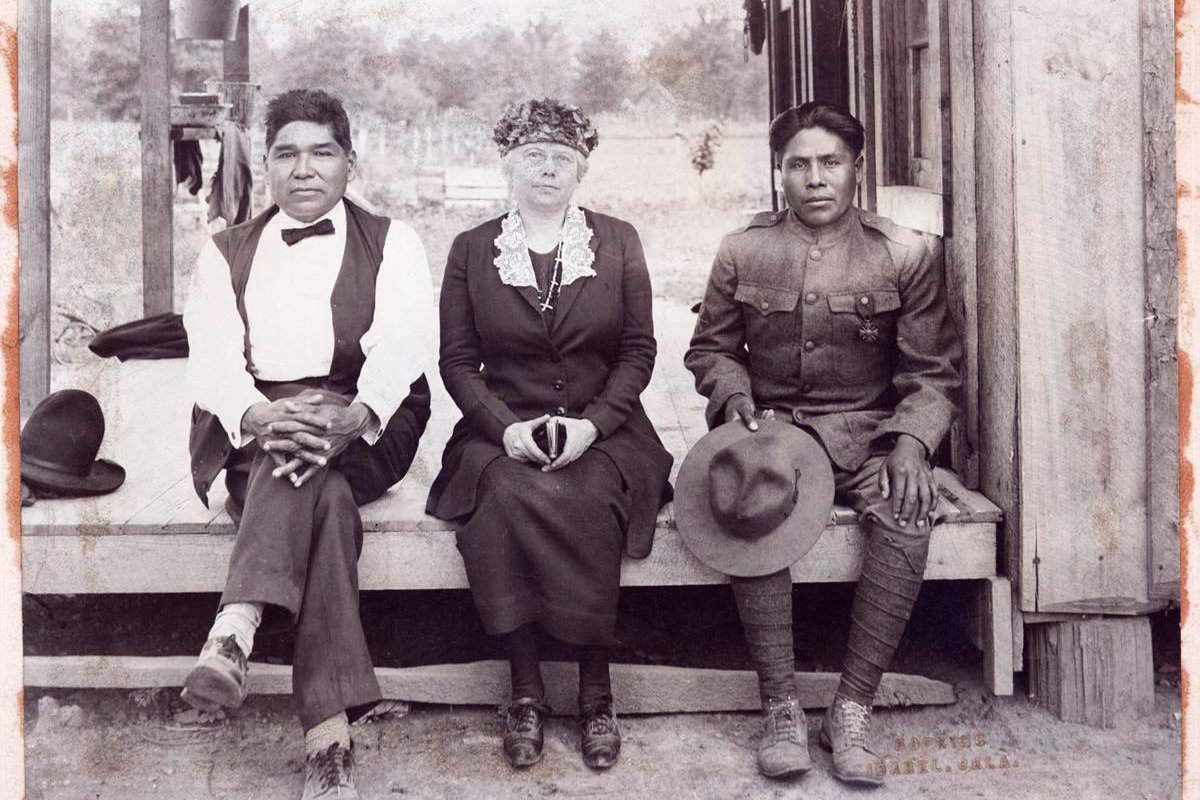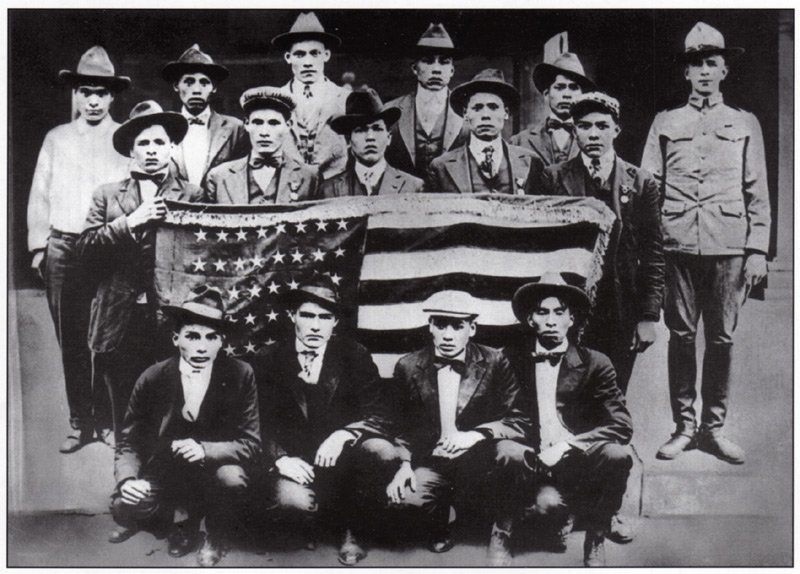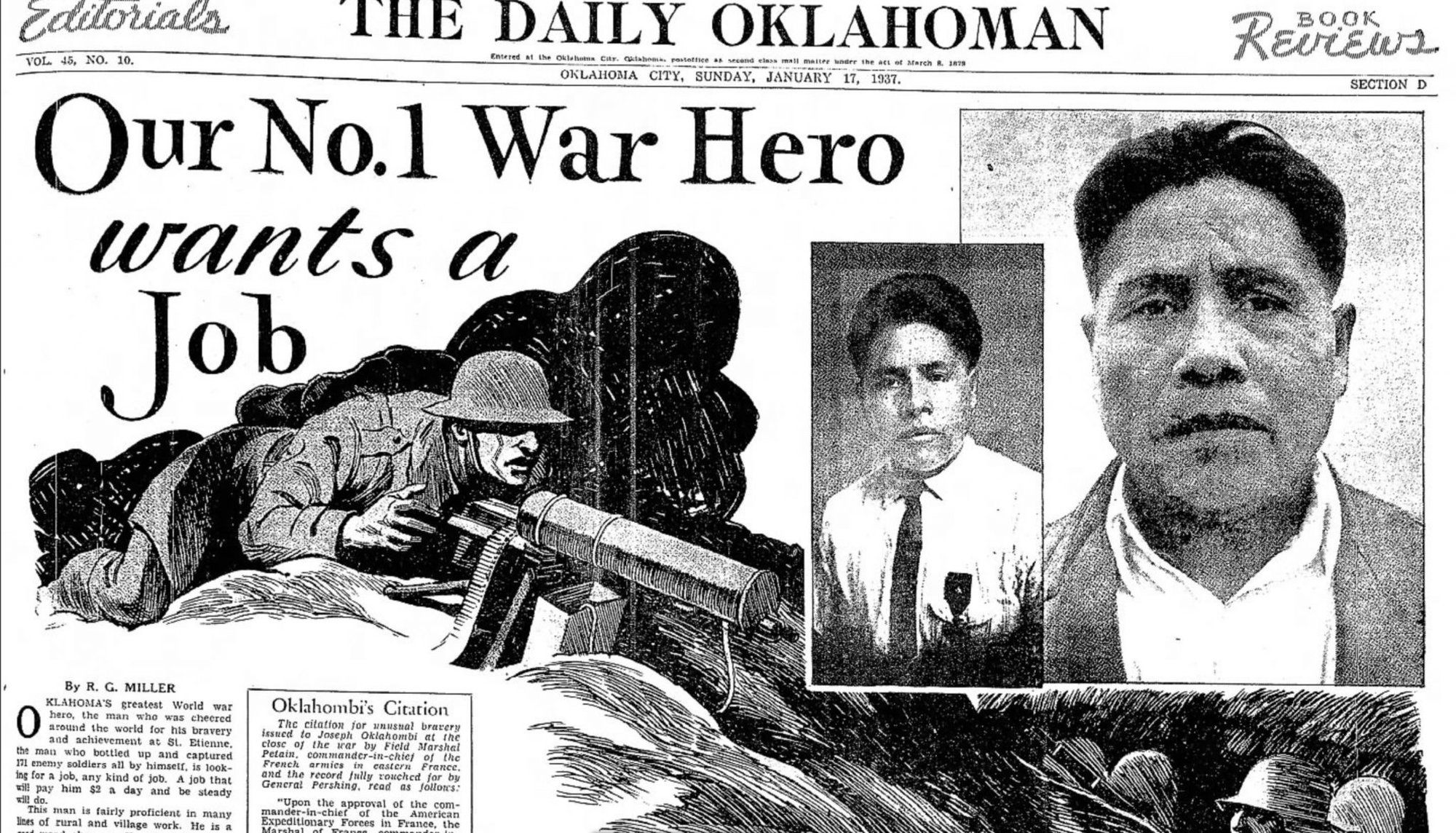
Choctaw Code Talker Pvt. Joseph Oklahombi, right, sits in his home near Wright City, Oklahoma, in 1921. Oklahombi was one of the most decorated World War I soldiers from Oklahoma. Photo courtesy of the Oklahoma Historical Society.
German intelligence intercepted Allied military correspondence throughout October 1918 during the Meuse-Argonne campaign. In response to the Allies’ need to deliver coded messages to various front-line positions, the US Army enlisted the help of Choctaw Nation soldiers within the 141st, 142nd, and 143rd Infantry Regiments.
These ingenious men were a part of the original group of “Code Talkers,” or Native American interpreters, from World War I who relayed sensitive military communications to officers in the field. These messages were translated from their native languages into English.
Pvt. Joseph Oklahombi of the 141st Infantry Regiment went beyond his duties as a translator, however, when he and 23 other members of his unit participated in a French-led diversionary attack at the Battle of Blanc Mont Ridge near Saint-Etienne-a-Arnes in France on Oct. 8, 1918.

Oklahombi braved a violent artillery barrage and scampered some 210 yards through barbed wire entanglements across no man’s land to ambush a series of German machine-gun nests. Leading his force from the front, he stormed the German stronghold and captured more than 50 machine guns, several trench mortars, and 171 prisoners. According to some accounts, Oklahombi and his men also seized an artillery site and killed nearly 80 Germans in their assault.
Under relentless shelling (including the use of chemical gas), Oklahombi held the line for the next four days. Without resupply of food, water, or ammunition, Oklahombi crossed no man’s land many times to acquire intelligence on enemy forces and assist his wounded comrades.
At that time, no Native American service members from World War I had received the Medal of Honor. The US didn’t consider Native Americans as US citizens until 1924, some eight years after Oklahombi’s battlefield heroics. Still, the French government awarded Oklahombi the Croix de Guerre, one of the country’s highest medals for gallantry. For its part, the US military issued Oklahombi the Silver Star medal, the third-highest achievement for valor.
When the front went quiet on Nov. 11, 1918, Oklahombi returned to his native Oklahoma, where he and his wife raised a son. A Hollywood studio offered him a movie deal and cast him to play a soldier in a war film. However, a movie executive wouldn’t pay for his travel, so Oklahombi never made it to Hollywood.

“When he came home from war, they told him not to talk about how he served as a code talker in case they needed to use the language again,” Lee Watkins, a descendent of Oklahombi and member of Chihowa Okla United Methodist Church in Durant, Oklahoma, told United Methodist News. “For a long time, no one knew what he had done.”
In 1932, at age 37, Oklahombi requested government financial and disability assistance. Since he wasn’t wounded in the war, a government paycheck was never in the cards. Oklahombi couldn’t get a job, and for five years he struggled to obtain financial assistance. In 1937, The Daily Oklahoman featured a profile about Oklahombi’s war record and a report on the US government’s failure to take care of its Native American veterans.
“The chances are that Oklahombi has earned less than $1,000 in cash in the 18 1/2 years since he returned from the war,” reporter R.G. Miller wrote.
A truck struck and killed Oklahombi in 1960. His vocal supporters have advocated for his Silver Star medal to be upgraded to the Medal of Honor. So far, the effort has not succeeded.
Read Next: How the Navajo Code Talkers Changed the Course of World War II

Matt Fratus is a history staff writer for Coffee or Die. He prides himself on uncovering the most fascinating tales of history by sharing them through any means of engaging storytelling. He writes for his micro-blog @LateNightHistory on Instagram, where he shares the story behind the image. He is also the host of the Late Night History podcast. When not writing about history, Matt enjoys volunteering for One More Wave and rooting for Boston sports teams.
BRCC and Bad Moon Print Press team up for an exclusive, limited-edition T-shirt design!
BRCC partners with Team Room Design for an exclusive T-shirt release!
Thirty Seconds Out has partnered with BRCC for an exclusive shirt design invoking the God of Winter.
Lucas O'Hara of Grizzly Forge has teamed up with BRCC for a badass, exclusive Shirt Club T-shirt design featuring his most popular knife and tiomahawk.
Coffee or Die sits down with one of the graphic designers behind Black Rifle Coffee's signature look and vibe.
Biden will award the Medal of Honor to a Vietnam War Army helicopter pilot who risked his life to save a reconnaissance team from almost certain death.
Ever wonder how much Jack Mandaville would f*ck sh*t up if he went back in time? The American Revolution didn't even see him coming.
A nearly 200-year-old West Point time capsule that at first appeared to yield little more than dust contains hidden treasure, the US Military Academy said.












